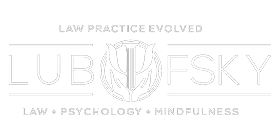Much of traditional law practice, especially that involving litigation or conflict resolution, involves an attempt to understand past events in terms of “facts” recalled by involved parties, then analyzing these recollections in the context of legislation, regulations, or prior court opinions. Because of this orientation, the first question an attorney is likely to ask of a new client is “What happened?” The client will then embark on an exercise to recreate a complex chain of events, some of which may have occurred months or years in what we call the past.
Holistic law practice starts not from the question of “What happened?” but rather from the question of “What is happening now?” The difference in this orientation is largely the difference between thought and mindfulness. Mindfulness refers to a state of deeply connected awareness of the present moment. This awareness is grounded not in thought, but beyond thought. By cultivating an ability to access the present moment, we reconnect to our foundational sense of being. This state gives rise to an experiential realization that we are all part of something far beyond our individual life situations. It is upon tapping into this reality that we develop true understanding and compassion for others, even those whom we had previously “blamed” for our current legal difficulties.
By contrast, the intellectual, predominantly thinking-based approach to many legal situations involving conflict is misguided. First, this approach depends largely on the futility of human memory to accurately recreate past events. Additionally, thought is often inextricably tangled with ego in a vast majority of our contemporary society. When ego is invoked, defenses arise and “conflict resolution” quickly devolves into “winning” and “blaming.”
At its core, the difference between mindfulness and thought is the injection of time. Mindfulness refers to a connection to the present moment – i.e., “life” – which is infinite and timeless. Thought largely involves the fictional “past” and “future” which often do little more than muddle the sense of inner peace associated with mindful attention to the present moment.
Of course, thought is an integral tool called on to address legal issues, but should ideally be invoked as a tool once the client has accessed his or her sense of being through mindful awareness of the present moment. Actions springing from this point of awareness will prove far more beneficial to the client both in the short and longer-terms. These positive outcomes, over time, can also help heal our society pervasively dominated by egoistic thought.
